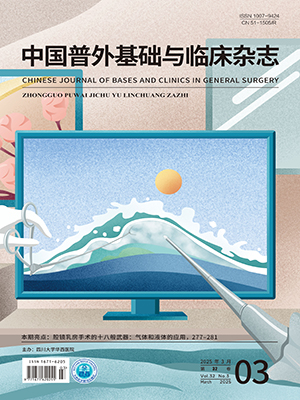| 1. |
Ohtani H, Tamamori Y, Noguchi K, et al. Meta-analysis of laparoscopy-assisted and open distal gastrectomy for gastric cancer. J Surg Res, 2011, 171(2): 479-485.
|
| 2. |
Lin JX, Huang CM, Zheng CH, et al. Laparoscopy-assisted gastrectomy with D2 lymph node dissection for advanced gastric cancer without serosa invasion: a matched cohort study from South China. World J Surg Oncol, 2013, 11(1): 4-8.
|
| 3. |
Kim KH, Kim MC, Jung GJ. Is the rate of postoperative complications following laparoscopy-assisted gastrectomy higher in elderly patients than in young patients? World J Surg Oncol, 2014, 12(1): 1-6.
|
| 4. |
邬颖杰, 陆国文, 章懿欣. 腹腔镜在远端胃癌 D2 根治术中的应用价值. 肿瘤学杂志, 2013, 19(4): 289-291.
|
| 5. |
Jiang L, Yang KH, Guan QL, et al. Laparoscopy-assisted gastr-ectomy versus open gastrectomy for resectable gastric cancer: anupdate meta-analysis based on randomized controlled trials. Surg Endosc, 2013, 27(7): 2466-2480.
|
| 6. |
黄江龙, 卫洪波, 郑宗珩, 等. 进展期远端胃癌腹腔镜与开腹根治术的对照研究. 中华胃肠外科杂志, 2012, 15(6): 615-617.
|
| 7. |
Gordon AC, Kojima K, Inokuchi M, et al. Long-term comparison of laparoscopy-assisted distal gastrectomy and open distal gastrectomy in advanced gastric cancer. Surg Endosc, 2013, 27(2): 462-470.
|
| 8. |
杜建军, 王飞, 赵青川, 等. 完全腹腔镜胃癌 D2 根治术 150 例报道. 中华腔镜外科杂志: 电子版, 2012, 5(4): 298-302.
|
| 9. |
Viñuela EF, Gonen M, Brennan MF, et al. Laparoscopic versus open distal gastrectomy for gastric cancer: a meta-analysis of randomized controlled trials and high-quality nonrandomized studies. Ann Surg, 2012, 255(3): 446-456.
|
| 10. |
Matsuzaki S, Jardon K, Maleysson E, et al. Impact of intraperitoneal pressure of a CO2 pneumopcritoneum on the surgical peritoneal environment. Hum Reprod, 2012, 27(6): 1613-1623.
|
| 11. |
Bogani G, Martinelli F, Ditto A, et al. Pneumoperitoneum pressures during pelvic laparoscopic surgery: a systematic review and meta-analysis. Eur J Obstet Gynecol Reprod Biol, 2015, 195(10): 1-6.
|
| 12. |
王乐声, 洪建明, 陈培臻, 等. 轻中度慢性阻塞性肺疾病患者行腹腔镜与开腹胃癌根治性手术的安全性比较. 中国微创外科杂志, 2015, 15(5): 405-409.
|
| 13. |
陈志远, 吴健华, 王玉珍, 等. 低潮气量联合呼气末正压通气对慢性阻塞性肺疾病患者腹腔镜手术时肺功能的影响. 中华麻醉学杂志, 2013, 33(10): 1229-1232.
|
| 14. |
Scatizzi M, Kröning KC, Lenzi E, et al. Laparoscopic versus open distal gastrectomy for locally advanced gastric cancer: a case-control study. Updates Surg, 2011, 63(1): 17-23.
|
| 15. |
苏向前, 杨宏. 腹腔镜胃癌手术不应忽视肿瘤治疗的原则. 中华胃肠外科杂志, 2013, 16(2): 118-120.
|
| 16. |
宋鹏, 吴蕾. 胃癌的淋巴结转移与清扫研究进展. 中国普外基础与临床杂志, 2012, 19(1): 116-121.
|
| 17. |
Chen K, Xu XW, Mou YP, et al. Systemtic review and meta-analysis of laparoseopic and open gastrectomy for advanced gastric cancer. World J Surg Oncol, 2013, 11: 182.
|
| 18. |
刘伟, 安杰, 侯会池, 等. 腹腔镜胃癌根治术治疗老年胃癌患者的疗效及体会. 中国现代普通外科进展, 2013, 16(9): 738-740.
|
| 19. |
张永康, 黄华俊. 腹腔镜胃癌根治术对老年胃癌患者的临床疗效的影响. 实用癌症杂志, 2016, 31(10): 1662-1664, 1668.
|
| 20. |
Japanese Gastric Cancer Association. Japanese gastric cancer treatment guidelines 2010 (ver. 3). Gastric Cancer, 2011, 14(2): 113-123.
|
| 21. |
Ajani JA, Bentrem DJ, Besh S, et al. Gastric cancer, version 2. 2013: featured updates to the NCCN Guidelines. J Natl Compr Canc Netw, 2013, 11(5): 531-546..
|
| 22. |
Parkdo J, Han SU, Hyung WJ, et al. Long-term outcomes after laparoscopy-assisted gastrectomy for advanced gastric cancer: a large-scale multicenter retrospective study. Surg Endosc, 2012, 26(6): 1548-1553.
|
| 23. |
叶再生, 应敏刚, 陈路川, 等. 腹腔镜与开腹行胃癌 D2 根治术的对照研究及中期随访报告. 中国微创外科杂志, 2013, 13(11): 977-981.
|
| 24. |
黄许森, 陈小勋, 黄海舸, 等. 腔镜全胃切除 D2 淋巴结清扫术治疗进展期胃癌的疗效. 中国普通外科杂志, 2014, 23(4): 412-416.
|
| 25. |
王海磊, 刘春晓, 魏玉哲, 等. 单中心腹腔镜辅助与开腹远端胃癌 D2 根治术的临床对比报告. 哈尔滨医科大学学报, 2014, 41(1): 48-51.
|




